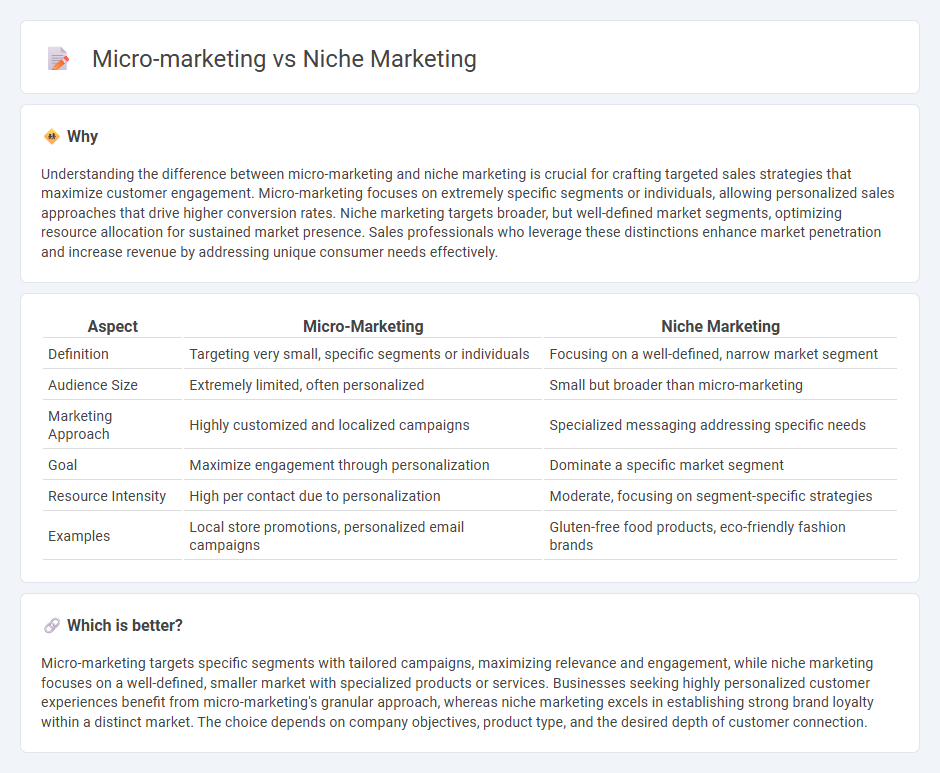
Micro-marketing targets a highly specific segment within a niche market, focusing on individual customer preferences and tailored campaigns to maximize engagement. Niche marketing addresses a broader, well-defined audience with unique needs, allowing businesses to specialize their offerings and dominate smaller market spaces. Explore how each strategy can amplify your sales efforts and drive growth.
Why it is important
Understanding the difference between micro-marketing and niche marketing is crucial for crafting targeted sales strategies that maximize customer engagement. Micro-marketing focuses on extremely specific segments or individuals, allowing personalized sales approaches that drive higher conversion rates. Niche marketing targets broader, but well-defined market segments, optimizing resource allocation for sustained market presence. Sales professionals who leverage these distinctions enhance market penetration and increase revenue by addressing unique consumer needs effectively.
Comparison Table
| Aspect | Micro-Marketing | Niche Marketing |
|---|---|---|
| Definition | Targeting very small, specific segments or individuals | Focusing on a well-defined, narrow market segment |
| Audience Size | Extremely limited, often personalized | Small but broader than micro-marketing |
| Marketing Approach | Highly customized and localized campaigns | Specialized messaging addressing specific needs |
| Goal | Maximize engagement through personalization | Dominate a specific market segment |
| Resource Intensity | High per contact due to personalization | Moderate, focusing on segment-specific strategies |
| Examples | Local store promotions, personalized email campaigns | Gluten-free food products, eco-friendly fashion brands |
Which is better?
Micro-marketing targets specific segments with tailored campaigns, maximizing relevance and engagement, while niche marketing focuses on a well-defined, smaller market with specialized products or services. Businesses seeking highly personalized customer experiences benefit from micro-marketing's granular approach, whereas niche marketing excels in establishing strong brand loyalty within a distinct market. The choice depends on company objectives, product type, and the desired depth of customer connection.
Connection
Micro-marketing and niche marketing both focus on targeting specific customer segments with tailored marketing strategies to maximize engagement and conversion rates. Micro-marketing zeroes in on very small groups or even individual customers using personalized campaigns, while niche marketing targets broader, well-defined market segments with distinct needs and preferences. Both approaches enhance customer relevance by delivering highly customized value propositions, leading to increased brand loyalty and higher sales efficacy.
Key Terms
Target Audience
Niche marketing targets a specific segment of the market defined by distinct needs or preferences, while micro-marketing hones in even further on highly detailed demographics or individualized customer profiles. Both strategies aim to increase relevance and engagement by tailoring messages and products to narrower audiences, enhancing customer loyalty and conversion rates. Explore how these focused approaches can boost your marketing effectiveness and drive business growth.
Market Segmentation
Niche marketing targets specific, well-defined market segments by offering tailored products or services that meet unique customer needs, while micro-marketing drills down even further, focusing on individual customers or highly localized groups for personalized strategies. Market segmentation in niche marketing involves broader categories such as age, income, or lifestyle, whereas micro-marketing emphasizes hyper-local or individual preferences, often utilizing detailed data analytics and customer insights. Explore detailed strategies and examples to understand how both approaches can drive precision in market segmentation.
Personalization
Niche marketing targets a specific segment of the market defined by shared interests or characteristics, enabling tailored messaging that resonates with a broader yet defined group. Micro-marketing zeroes in on individual or very small segments, using data-driven personalization to address unique preferences and behaviors at a granular level. Explore the nuances between niche marketing and micro-marketing to enhance your personalization strategy.
Source and External Links
Learn about niche markets -- benefits, examples, and strategies - Niche marketing targets a highly specific segment of a market with unique needs and behaviors, helping businesses stand out and connect deeply with a well-defined audience by tailoring their messaging and products accordingly.
What is niche marketing? Definition, strategies, examples - Niche marketing is a focused advertising approach aimed at a narrow, well-defined audience with specific needs or preferences, allowing brands to differentiate themselves and maximize marketing ROI in a competitive landscape.
What is Niche Marketing? Benefits + Strategies | Sprout Social - By promoting products or services to a small, specific audience defined by demographics, geography, or psychographics, niche marketing helps brands reach relevant consumers more easily and authentically, often leveraging influencer partnerships for greater impact.
 dowidth.com
dowidth.com